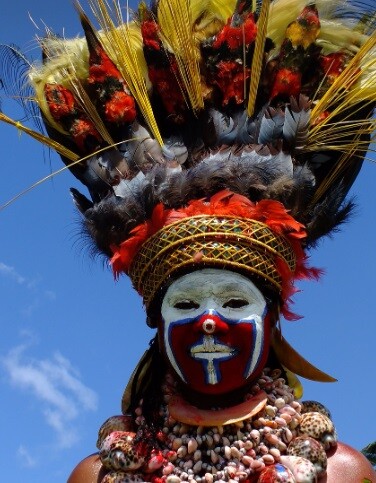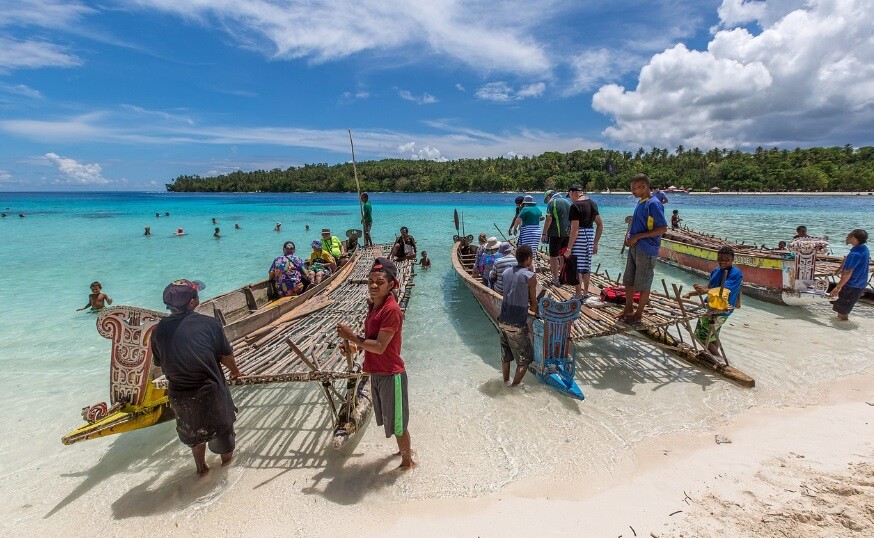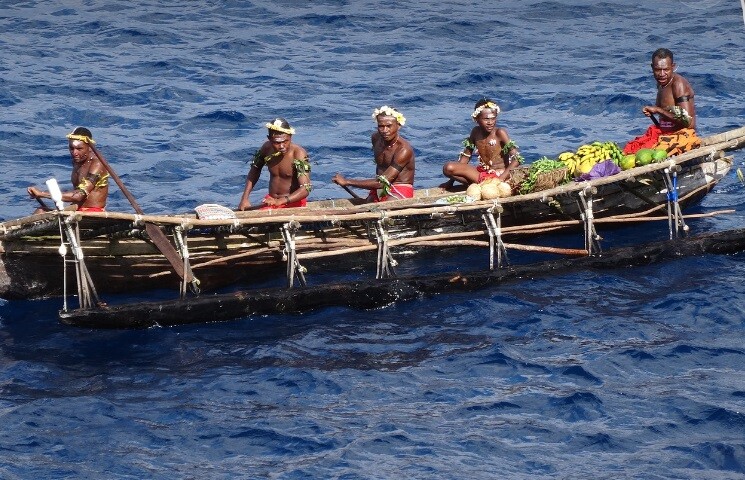Papua New Guinea is a unique and culturally rich country with a diverse environment. Here are ten amazing facts about Papua New Guinea that families and kids might find fascinating:
- Cultural Diversity:
- Papua New Guinea is one of the most culturally diverse countries in the world, with over 800 indigenous languages spoken. This diversity is reflected in the traditional costumes, dances, and rituals that families can experience.
- Birds of Paradise:
- Papua New Guinea is home to more than 38 species of Birds of Paradise, known for their vibrant and colorful plumage. Birdwatching can be an exciting activity for families, and kids will be amazed by the unique avian species.
- Traditional Canoe Building:
- The people of Papua New Guinea have a long history of building intricate canoes using traditional methods. Learning about these techniques can be a hands-on experience for children, providing insights into the local craftsmanship.
- Kokoda Track:
- The Kokoda Track is a famous trekking route that holds historical significance from World War II. While it may not be suitable for young children, older kids and adventurous families can explore this challenging yet rewarding trail.
- Tribal Art and Crafts:
- Papua New Guinea is known for its vibrant tribal art and crafts. Families can visit local markets to see and purchase traditional carvings, masks, and woven items, providing a cultural immersion for kids.
- Coral Reefs and Marine Life:
- The coastal areas of Papua New Guinea boast some of the most biodiverse coral reefs in the world. Snorkeling or diving in these waters can be an incredible experience for families, with the opportunity to see colorful coral and diverse marine life.
- Active Volcanoes:
- Papua New Guinea is part of the Pacific Ring of Fire, resulting in several active volcanoes. While it might not be safe to approach some of these, learning about volcanic activity can be a fascinating educational experience for kids.
- Sing-Sing Festivals:
- Sing-Sing festivals are traditional gatherings where various tribes showcase their unique dances, costumes, and music. Attending a Sing-Sing festival provides families with a lively and cultural experience.
- Papua New Guinea’s Unique Fauna:
- Papua New Guinea is home to a variety of unique wildlife, including tree kangaroos, cassowaries, and the world’s smallest parrot, the buff-faced pygmy parrot. Exploring local wildlife can be an exciting adventure for kids.
- Village Stays:
- Some regions of Papua New Guinea offer village stays, where families can immerse themselves in the local way of life. It’s a great opportunity for kids to learn about traditional customs, daily activities, and communal living.
Before planning any activities, it’s crucial to consider the safety and suitability for children, especially in remote areas. Additionally, respecting local customs and seeking guidance from local authorities can enhance the overall experience for families visiting Papua New Guinea.

Top 10 Festivals in Papua New Guinea
Papua New Guinea is rich in cultural diversity, and its festivals are vibrant celebrations of tradition, dance, and art. Here are ten festivals that families and kids might find interesting:
- Goroka Show:
- The Goroka Show is one of the largest cultural festivals in Papua New Guinea. It features traditional dances, music, and vibrant displays of tribal costumes. Families can witness the diverse cultures of different tribes coming together in a colorful celebration.
- Mount Hagen Show:
- Similar to the Goroka Show, the Mount Hagen Show is a major cultural event showcasing the traditions of various tribes through dance, music, and elaborate tribal costumes. It provides a unique cultural experience for families.
- Enga Cultural Show:
- The Enga Cultural Show highlights the cultural heritage of the Enga Province. Families can enjoy traditional dances, rituals, and witness the unique customs of the Enga people.
- Hiri Moale Festival:
- The Hiri Moale Festival celebrates the seafaring traditions of the Motu-Koitabu people. Families can enjoy canoe races, cultural performances, and traditional storytelling during this festival.
- Kenu and Kundu Festival:
- Held in Alotau, the Kenu and Kundu Festival focuses on traditional canoe and drum making. Families can witness vibrant canoe races, cultural displays, and performances representing the diverse cultures of Milne Bay Province.
- Sepik Crocodile Festival:
- The Sepik Crocodile Festival showcases the significance of the crocodile in Sepik River cultures. Families can observe crocodile dances, traditional art displays, and participate in various cultural activities.
- Morobe Show:
- The Morobe Show in Lae is a family-friendly event featuring agricultural exhibits, cultural performances, and traditional food displays. It provides a mix of cultural and educational experiences for families.
- National Mask Festival:
- The National Mask Festival in East New Britain showcases the diverse traditional masks used in ceremonies and rituals. Families can enjoy mask displays, traditional dances, and art exhibitions.
- Kokopo Warwagira:
- The Kokopo Warwagira Festival celebrates the unique cultures of East New Britain. Families can participate in cultural events, traditional dances, and witness the craftsmanship of the locals.
- Tumbuan Mask Festival:
- Held in Rabaul, the Tumbuan Mask Festival features the use of traditional masks in performances. Families can enjoy cultural displays, mask-making demonstrations, and learn about the significance of masks in local traditions.
When attending these festivals with family and kids, it’s advisable to check the specific dates, plan accommodations in advance, and be mindful of local customs. Additionally, respecting the performers and asking questions can enhance the educational experience for children.

Top 10 Entertainment in Papua New Guinea
Papua New Guinea offers a range of unique experiences for families and kids, blending cultural immersion with outdoor adventures. Here are ten entertainment options for families in Papua New Guinea:
- Cultural Villages:
- Visit traditional cultural villages to experience the rich heritage of Papua New Guinea. Families can witness traditional dances, learn about local customs, and interact with community members.
- Kokoda Track:
- While the entire Kokoda Track may not be suitable for young children, families can explore sections of it to learn about the history of World War II and enjoy the stunning natural surroundings.
- Masks and Arts:
- Explore local markets and artisan workshops where families can see traditional mask-making, wood carving, and other forms of indigenous art. Some markets, such as Port Moresby’s Arts and Crafts Market, offer unique pieces.
- Kokopo War Museum:
- The Kokopo War Museum provides insights into the wartime history of Papua New Guinea. Families can explore exhibits and artifacts, gaining a better understanding of the region’s role during World War II.
- Nature and Wildlife Tours:
- Papua New Guinea boasts diverse flora and fauna. Families can embark on nature tours to explore rainforests, visit wildlife sanctuaries, and experience the unique biodiversity of the region.
- Scuba Diving and Snorkeling:
- For families with older kids, Papua New Guinea offers world-class scuba diving and snorkeling opportunities. Explore coral reefs, underwater caves, and vibrant marine life in places like Milne Bay and Kimbe Bay.
- Beach Activities:
- Enjoy the beautiful beaches of Papua New Guinea. Families can have picnics, play beach games, and relax by the seaside. Some areas, like Tufi, offer family-friendly beach resorts.
- Hiking and Nature Walks:
- Many regions in Papua New Guinea offer family-friendly hiking trails and nature walks. This can be a great way for kids to experience the lush landscapes and unique plant life of the country.
- Bird Watching:
- Papua New Guinea is a birdwatcher’s paradise, home to numerous exotic species. Families can explore birding hotspots, such as Varirata National Park, to observe colorful birds like the Raggiana Bird of Paradise.
- Local Festivals:
- Attend local festivals, like the Hiri Moale Festival or the Kenu and Kundu Festival, where families can enjoy cultural performances, traditional dances, and local food.
When engaging in outdoor activities, be sure to consider safety precautions, especially if traveling with younger children. Additionally, it’s recommended to check with local guides or authorities for the most suitable family-friendly options based on your preferences and the ages of your children.

Top 10 Exotic Cuisines in Papua New Guinea
Papua New Guinea’s cuisine is diverse and reflects the country’s rich cultural heritage. While the options might be different from what many people are accustomed to, exploring Papua New Guinean cuisine can be a unique and exotic culinary experience. Here are ten dishes to try:
- Mumu:
- Mumu is a traditional method of cooking where food is wrapped in banana leaves and then cooked underground on hot stones. It’s often a communal event and can include a variety of meats and vegetables.
- Sago:
- Sago is a starchy substance extracted from the pith of various types of palm trees. It is a staple food in Papua New Guinea and is used to make a variety of dishes, including sago pancakes and sago pudding.
- Kaukau (Sweet Potato):
- Sweet potatoes, locally known as kaukau, are a common and versatile ingredient in Papua New Guinean cuisine. They are used in various dishes, from savory stews to sweet desserts.
- Kokoda:
- Kokoda is a traditional dish similar to ceviche, where raw fish is marinated in coconut cream, lime juice, and various seasonings. It’s a popular and refreshing dish, especially in coastal regions.
- Rice and Greens:
- A simple yet delicious combination, rice is often served with leafy greens and coconut milk, providing a satisfying and nutritious meal.
- Roast Pork:
- Pork is a commonly consumed meat, and roast pork is a popular preparation. It is often cooked over an open flame or in traditional earth ovens.
- Pawpaw (Papaya) Salad:
- Pawpaw salad is a refreshing dish made with ripe papaya, lime juice, chili, and sometimes fish. It’s a delightful mix of sweet and spicy flavors.
- Bilum Bread:
- Bilum bread is a unique type of bread made with bilum, a traditional woven bag. The bilum gives the bread a distinct texture and flavor.
- Cassava Cake:
- Cassava, a starchy root vegetable, is used to make various dishes in Papua New Guinea. Cassava cake, often sweetened with coconut milk and sugar, is a popular dessert.
- Pukpuk (Crocodile) Curry:
- Crocodile meat, known locally as pukpuk, is consumed in some regions. It’s prepared in various ways, and a crocodile curry is one of the exotic dishes you might encounter.
When trying these dishes, keep in mind that the availability of certain ingredients can vary by region. Additionally, local markets and street food stalls can be excellent places to sample authentic Papua New Guinean cuisine.

Top 10 Things to be Aware of in Papua New Guinea
Traveling to Papua New Guinea requires careful consideration of various factors due to its unique cultural and geographical characteristics. Here are ten things to be aware of when visiting Papua New Guinea:
- Cultural Sensitivity:
- Papua New Guinea is incredibly diverse, with numerous indigenous cultures and languages. It’s essential to respect local customs and traditions. Ask for permission before taking photographs, and be aware of cultural norms in each region.
- Safety Concerns:
- Some areas of Papua New Guinea can experience high crime rates, particularly in urban areas. It’s crucial to stay informed about the security situation and take necessary precautions, such as avoiding poorly lit areas and not displaying valuable items.
- Health Precautions:
- Papua New Guinea is in a malaria zone, so taking anti-malarial medication and using insect repellent are essential. Additionally, ensure your vaccinations are up-to-date and consider health insurance that covers evacuation in case of emergencies.
- Limited Infrastructure:
- Infrastructure, especially in remote areas, may be limited. Roads can be challenging, and transportation options may be basic. It’s advisable to plan for potential delays and be prepared for rustic conditions in some locations.
- Diverse Languages:
- Papua New Guinea is incredibly linguistically diverse, with over 800 languages spoken. English is an official language, but locals often speak their native languages. Learning a few basic phrases in Tok Pisin (a widely spoken creole) can be helpful.
- Customs and Ceremonies:
- Papua New Guinea is known for its unique customs and ceremonies. It’s important to be respectful and seek guidance from locals or tour operators to understand the significance of events you might encounter.
- Cash is King:
- Credit cards are not widely accepted, especially in rural areas. It’s advisable to carry enough cash, preferably in smaller denominations, for your needs. ATMs may not be readily available in some places.
- Natural Hazards:
- Papua New Guinea is prone to earthquakes and volcanic activity due to its location on the Pacific Ring of Fire. Stay informed about the current situation, especially if you plan to visit areas near active volcanoes.
- Local Transportation Challenges:
- Domestic flights and local transportation may face irregular schedules and sometimes unexpected cancellations. Be flexible with your plans and allow for potential delays.
- Environmental Respect:
- Papua New Guinea is known for its pristine natural beauty. Visitors should be environmentally conscious, dispose of waste responsibly, and respect the ecosystems, especially when engaging in outdoor activities.
Before traveling to Papua New Guinea, it’s advisable to check travel advisories, stay informed about local conditions, and, if possible, consult with local guides or tour operators for up-to-date information. Respect for local cultures and a sense of adventure can contribute to a rewarding experience in this unique destination.
You may also like,








